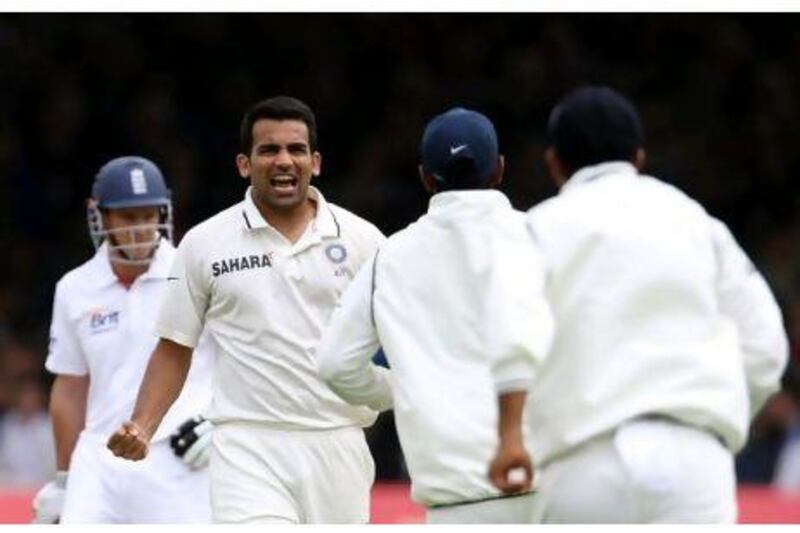David "Bumble" Lloyd had probably been waiting for that moment as he sat in the commentary box at the Lord's yesterday.
In the fourth over of the day, when Praveen Kumar hit Alastair Cook high on the pads and followed up with a lengthy appeal, there was a muffled laugh from the commentators and the conversation shifted towards India's aversion for the umpire Decision Revision System (DRS).
India have agreed to only the minimum standards of DRS for this series: infrared technology and stump microphones, which rules out a review of leg-before-wicket decisions. That left Kumar with no recourse after the umpire had turned down his appeal.
"I can only deduce that they don't want the right decisions," said Lloyd.
Rather, India's reluctance stems from their poor use of the referral system in the past. In 2008, when the DRS was last used for a Test series involving India, Sri Lanka made 11 successful referrals, while MS Dhoni's team had just one. At the World Cup earlier this year, India consistently failed to use the DRS effectively as well.
They often present Ian Bell's lbw decision, during a World Cup league match, as an argument against the DRS. But why forget the reprieve that Sachin Tendulkar got during the semi-final against Pakistan?
Tendulkar was on 23 when he was declared lbw by the umpire Ian Gould, but a referral allowed him to carry on and compile a match-winning 85. India went on to win the World Cup, but what if the system had not been in use?
Now, should Tendulkar be adjudged lbw somewhere in the 80s or 90s in this ongoing Test, India's millions of cricket fans would be left ruing their board's posturing on the DRS as cricket's greatest run-getter could finish his career without his name on the Lord's honours board.
The ball-tracking system is far from perfect, and there is some merit in Dhoni's lament about it being an "adulteration of technology with human thinking", as the Hawk-Eye or Virtual Eye attempts to predict the trajectory of the ball through an algorithm using information extracted from video recordings.
People such as the veteran commentator, Mike Haysman, stand with India on this issue, and he recently sought to "debunk a myth or two about ball-tracking technology".
According to the South African, the Hawk-Eye and Virtual Eye were introduced for the "entertainment factor" and "precise decision-making was not part of the initial creative master plan".
Taking those different views onboard, the International Cricket Council (ICC) agreed to "independently confirm" the accuracy of ball-tracking technology after their meeting in Hong Kong earlier this month, and treat it as a matter of urgency.
Until then, you can only speculate on the effectiveness of the Hawk-Eye or Virtual Eye, with both systems being dependent on the cameras used by the broadcasters.
The cameras could range from 25-frames-per-second at the low end to 250-frames-per-second at the top end. The faster cameras provide more accurate information but cost more as well.
The India board can certainly afford the costs of the best cameras, but other, not-so-privileged nations could opt for cheaper options, which then would defeat the very purpose of the DRS.
Pakistan are keen to use the system for their upcoming series against Sri Lanka and England in the UAE, but they do not have an agreement with their broadcaster on the mandatory use of the technology.
If they want to implement the technology it could cost the board around US$40,000 to $50,000 (Dh147,000 to Dh184,000). For a cash-strapped board like Pakistan's, the cost factor could be a hindrance.
A way out, then, as the former Australia captain, Ian Chappell, recently pointed out, would be the International Cricket Council putting the DRS under its direct control for the sake of consistency.
Much about the DRS remains to be discussed, but unfortunately, it has turned into another India v The Rest of the World contest. Cricket cannot afford two sets of playing conditions - one for India and another for the rest.
The onus falls on the ICC, but as Martin Crowe, one of the first proponents of the system, said: "ICC won't pay, and India won't play."





